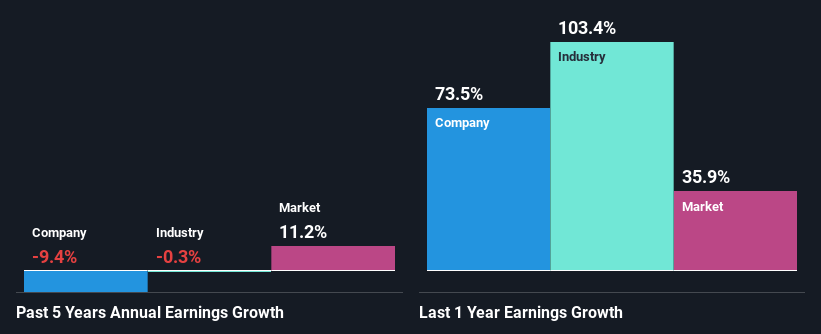Are Cromwell Property Group's (ASX:CMW) Fundamentals Good Enough to Warrant Buying Given The Stock's Recent Weakness?
With its stock down 4.9% over the past week, it is easy to disregard Cromwell Property Group (ASX:CMW). But if you pay close attention, you might find that its key financial indicators look quite decent, which could mean that the stock could potentially rise in the long-term given how markets usually reward more resilient long-term fundamentals. Specifically, we decided to study Cromwell Property Group's ROE in this article.
Return on Equity or ROE is a test of how effectively a company is growing its value and managing investors’ money. Simply put, it is used to assess the profitability of a company in relation to its equity capital.
Check out our latest analysis for Cromwell Property Group
How Is ROE Calculated?
The formula for return on equity is:
Return on Equity = Net Profit (from continuing operations) ÷ Shareholders' Equity
So, based on the above formula, the ROE for Cromwell Property Group is:
12% = AU$308m ÷ AU$2.7b (Based on the trailing twelve months to June 2021).
The 'return' is the yearly profit. So, this means that for every A$1 of its shareholder's investments, the company generates a profit of A$0.12.
Why Is ROE Important For Earnings Growth?
We have already established that ROE serves as an efficient profit-generating gauge for a company's future earnings. We now need to evaluate how much profit the company reinvests or "retains" for future growth which then gives us an idea about the growth potential of the company. Assuming all else is equal, companies that have both a higher return on equity and higher profit retention are usually the ones that have a higher growth rate when compared to companies that don't have the same features.
Cromwell Property Group's Earnings Growth And 12% ROE
To start with, Cromwell Property Group's ROE looks acceptable. And on comparing with the industry, we found that the the average industry ROE is similar at 12%. For this reason, Cromwell Property Group's five year net income decline of 9.4% raises the question as to why the decent ROE didn't translate into growth. So, there might be some other aspects that could explain this. These include low earnings retention or poor allocation of capital.
Furthermore, even when compared to the industry, which has been shrinking its earnings at a rate 0.3% in the same period, we found that Cromwell Property Group's performance is pretty disappointing, as it suggests that the company has been shrunk its earnings at a rate faster than the industry.
Earnings growth is a huge factor in stock valuation. It’s important for an investor to know whether the market has priced in the company's expected earnings growth (or decline). By doing so, they will have an idea if the stock is headed into clear blue waters or if swampy waters await. What is CMW worth today? The intrinsic value infographic in our free research report helps visualize whether CMW is currently mispriced by the market.
Is Cromwell Property Group Efficiently Re-investing Its Profits?
Cromwell Property Group seems to be paying out most of its income as dividends judging by its LTM (or last twelve month) payout ratio of 59% (meaning, the company retains only 41% of profits). However, this is typical for REITs as they are often required by law to distribute most of their earnings. So this probably explains the company's shrinking earnings.
Moreover, Cromwell Property Group has been paying dividends for at least ten years or more suggesting that management must have perceived that the shareholders prefer dividends over earnings growth. Our latest analyst data shows that the future payout ratio of the company is expected to rise to 85% over the next three years. Therefore, the expected rise in the payout ratio explains why the company's ROE is expected to decline to 7.7% over the same period.
Summary
Overall, we feel that Cromwell Property Group certainly does have some positive factors to consider. However, while the company does have a high ROE, its earnings growth number is quite disappointing. This can be blamed on the fact that it reinvests only a small portion of its profits and pays out the rest as dividends. Having said that, we studied the latest analyst forecasts, and found that analysts are expecting the company's earnings growth to improve slightly. Sure enough, this could bring some relief to shareholders. To know more about the company's future earnings growth forecasts take a look at this free report on analyst forecasts for the company to find out more.
This article by Simply Wall St is general in nature. We provide commentary based on historical data and analyst forecasts only using an unbiased methodology and our articles are not intended to be financial advice. It does not constitute a recommendation to buy or sell any stock, and does not take account of your objectives, or your financial situation. We aim to bring you long-term focused analysis driven by fundamental data. Note that our analysis may not factor in the latest price-sensitive company announcements or qualitative material. Simply Wall St has no position in any stocks mentioned.
Have feedback on this article? Concerned about the content? Get in touch with us directly. Alternatively, email editorial-team (at) simplywallst.com.

 Yahoo Finance
Yahoo Finance 
